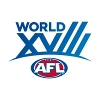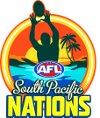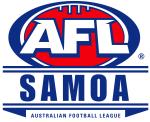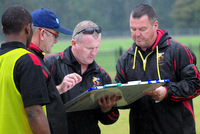WFN interview with Gabel Stathis : AFL Samoa
- Tuesday, August 28 2012 @ 07:40 pm ACST
- Contributed by: Michael Christiansen
- Views: 7,510
Welcome to World Footy News Wednesday, March 04 2026 @ 04:32 pm ACDT

 NEW Zealand-raised forward Khan Haretuku may be earmarked to be one of the most sought-after mature-age prospects heading into this year's AFL draft. Already this year he has represented New Zealand against the AIS-AFL Academy at Wellington Stadium and was selected in the VFL state team.
NEW Zealand-raised forward Khan Haretuku may be earmarked to be one of the most sought-after mature-age prospects heading into this year's AFL draft. Already this year he has represented New Zealand against the AIS-AFL Academy at Wellington Stadium and was selected in the VFL state team.
Mature age players have continued to fill gaps and become key players in recent times, notably James Podsiadly at Geelong, Stewart Crameri and Michael Hibberd at Essendon, Michael Barlow at Fremantle and even Ian Callinan at Adelaide.

When Karmichael Hunt kicked the much talked about goal after the siren on Saturday night to end the Gold Coasts 21 game losing streak, many of the modern themes of the AFL were in play. Hunt most famously a code crosser, former NRL star - lured to the game by cash, but also by his childhood memories of playing the game. Hunt was born in New Zealand and is an immigration success story (his parents were from Samoa and the Cook Islands) and an AFL multicultural ambassador .
The location of the match, Cazaly's Stadium in Cairns was also significant in the constant efforts to expand the game in non traditional locations and Hunt playing for the expansion Gold Coast club. Playing in Cairns, the third AFL venue in Qld, also brings the game to within a two hour flight of the PNG footy fronteir.


 South Pacific and World XVIII players joined GWS forward Israel Folau and the Sydney Swans Eugene Kreuger today at Luna Park in Sydney for a press opportunity. While the internationals playing in the Under 16 Championships posed for photos and appeared in news footage, the big issue in Sydney was centred around speculation that the NRL code crosser might be moving back to NRL. He calmly let the press know this was not the case.
South Pacific and World XVIII players joined GWS forward Israel Folau and the Sydney Swans Eugene Kreuger today at Luna Park in Sydney for a press opportunity. While the internationals playing in the Under 16 Championships posed for photos and appeared in news footage, the big issue in Sydney was centred around speculation that the NRL code crosser might be moving back to NRL. He calmly let the press know this was not the case.
The story from Fox Sports can be seen below.

When Richmond drafted Piva Wright from the Dandenong Stingrays last season, they added an extra flavor to a broad multicultural melting pot of players at Tiger land. In recent days, Piva, along with the Tigers international rookie player Gideon Simon (PNG), attended the final session of a 10 week footy program that had been run by Richmond for 25 primary-aged children from the Fitzroy housing .

 AFL Samoa has benefitted greatly over the last year from the presence of AYAD AFL development officer Gabel Stathis. Local footy and school programs have been reinvigorated. The AFL Samoa Committee (which includes people on the ground in Samoa as well as support from Australia) is advertising for the person to follow on from Gabel when his 12 month appointment expires.
AFL Samoa has benefitted greatly over the last year from the presence of AYAD AFL development officer Gabel Stathis. Local footy and school programs have been reinvigorated. The AFL Samoa Committee (which includes people on the ground in Samoa as well as support from Australia) is advertising for the person to follow on from Gabel when his 12 month appointment expires.
Samoan Opportunity

Will McKenzie lives in Auckland, is a former President and General Manager of what is now AFL New Zealand, founded the International Australian Football Council and instigated the International Cup, which he still regularly attends. In this article Will ponders the past, present and future of Australian football in New Zealand, with the inside knowledge of someone who has played a significant role in its recent history.
Being close to Australia, and with a long history in the game, many people look to New Zealand to see how football can develop outside Australia. New Zealand football during the 1990s, a decade when I was heavily involved in the game, has been referred to from time to time on WFN including recently in a discussion thread which has prompted me to write to give a picture of New Zealand football in the 1990s from where I was standing, and some thoughts about current and future developments.
Football of a predominantly Victorian variety was played in the colony of New Zealand from the late 1850s and was the only recognisable football code played in New Zealand until the first rugby match was played in 1870. Despite rugby taking off like a scrub fire, football did reasonably well having clubs in most parts of the colony by the turn of the 20th century when New Zealand declined an invitation to join the six other Australasian colonies in the forming of the Commonwealth of Australia. New Zealand was a member of the 1905 and 1908 Australasian Football Councils, the equivalent of today’s AFL Commission, and the New Zealand team, wearing all black, competed in the 1908 Jubilee Australasian Football Carnival at the Melbourne Cricket Ground in front of large crowds, getting well beaten by Victoria and Tasmania but defeating New South Wales and Queensland to finish fourth out of the seven state/colony teams. World War I crippled the sport here (as it did rugby union in Australia) and football in New Zealand did not survive the depression. The game was revived in 1974, leagues were formed in in Auckland, Wellington and Christchurch, and a league now operates in Hamilton as well.
In late 1990, at the end of my time as a student at the University of Canterbury, and with an understanding of football having lived in Geelong during the 70s and played a bit at school I wrote to AFL Chairman and CEO Ross Oakley to suggest that the AFL consider playing a match in New Zealand as the first part of a long term plan to ‘repopularise’ the game in New Zealand. Ross responded very positively. As there was no suitable venue in Christchurch I scoured various maps of various cities and eventually settled upon Western Springs Stadium, Auckland, which is a speedway venue. However it is possible to lay turf over a dirt track and the Auckland City Council kindly agreed to lay 10,000 square metres of turf to produce a 150m by 90m playing surface.

